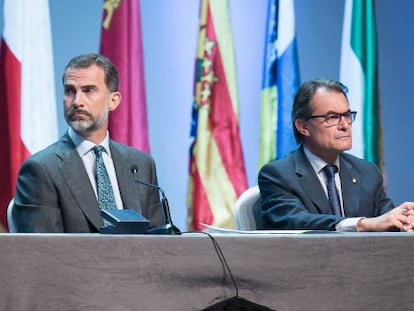Most Catalans see a clash with Madrid inevitable, new survey shows
Spanish and Catalan leaders get failing grades for their handling of the secessionist issue


With two months to go before Catalonia holds elections, residents of the northeastern region are increasingly convinced that a clash with Madrid is inevitable, a new opinion poll has revealed.
More than 60 percent of Catalans feel it is nearly impossible to prevent a confrontation with the rest of Spain at this point, according to a survey carried out by Metroscopia for EL PAÍS.
Both Catalans and citizens of other regions are similarly critical of the way Spanish Prime Minister Mariano Rajoy and Catalan premier Artur Mas have been dealing with the situation.
The survey also shows that 39 percent of Catalans feel secession would be bad for Catalonia, compared with 47 percent who see nothing but advantages
Mas and his secessionist bloc, Junts pel sí, are casting the September 27 ballot as a de facto plebiscite on sovereignty. If his group wins, Mas says, it will provide justification for a unilateral declaration of independence from Spain.
Meanwhile, the conservative government in Madrid is watching for any signs of unlawfulness in the way the Catalan election is officially announced, in which case it would turn to the Constitutional Court for support.
Catalonia held an informal referendum on independence on November 9 of last year after the ruling nationalist bloc CiU failed in its bid to hold a legal one. While that vote yielded a majority support for secession, outside observers gave it little credibility because of the way it was organized.
Since then, secessionists have been seeking new ways to achieve their goal while ramping up their anti-Madrid rhetoric. In the process, however, the two nationalist parties that made up CiU – Democratic Convergence of Catalonia (CDC) and Democratic Union of Catalonia (UDC) – have broken up after 37 years of nearly uninterrupted rule in the region.
The reason for the divorce is the independence drive, which UDC does not support. Instead, this party will run on a program of dialogue to obtain greater devolved powers from Spain.
This rift in Catalan politics is also extensive to society, as the Metroscopia survey reflects. The poll, conducted between July 20 and 22, shows that 60 percent of Catalans have lost all hope of seeing a political deal that will avoid a rupture with Spain between now and September 27.
The survey also shows that 39 percent of Catalans feel secession would be bad for Catalonia, compared with 47 percent who see nothing but advantages.
Secessionists have been seeking new ways to achieve their goal while ramping up their anti-Madrid rhetoric
Additionally, 54 percent of Catalans would like to see Spain become a federal state in which regions are freely associated but enjoy even greater devolved powers than they do now. Elsewhere in Spain, only 34 percent of respondents support this system, which is championed by the Socialist Party but has yet to be clearly defined.
Elsewhere in Spain, 55 percent of citizens still feel it is possible for politicians to find some common ground that will avoid a complete confrontation. And 73 percent agree that Catalan secession would be bad for Spain.
Outside Catalonia, 55 percent of respondents feel that Rajoy has not handled the challenge from the Catalan government properly, and has not been open to bilateral negotiations that could possibly have prevented the current escalation. But then, 59 percent of Catalans feel that Artur Mas is also making a mistake with his own secessionist strategy.
English version by Susana Urra.
Tu suscripción se está usando en otro dispositivo
¿Quieres añadir otro usuario a tu suscripción?
Si continúas leyendo en este dispositivo, no se podrá leer en el otro.
FlechaTu suscripción se está usando en otro dispositivo y solo puedes acceder a EL PAÍS desde un dispositivo a la vez.
Si quieres compartir tu cuenta, cambia tu suscripción a la modalidad Premium, así podrás añadir otro usuario. Cada uno accederá con su propia cuenta de email, lo que os permitirá personalizar vuestra experiencia en EL PAÍS.
En el caso de no saber quién está usando tu cuenta, te recomendamos cambiar tu contraseña aquí.
Si decides continuar compartiendo tu cuenta, este mensaje se mostrará en tu dispositivo y en el de la otra persona que está usando tu cuenta de forma indefinida, afectando a tu experiencia de lectura. Puedes consultar aquí los términos y condiciones de la suscripción digital.









































